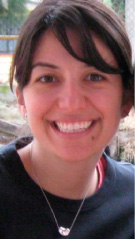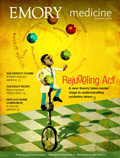Bittersweet journey

Maura George
As a medical student at Northwestern, Maura George set her sites on an internal medicine residency at Grady Memorial Hospital, which offered the diverse patient mix she desired. Ultimately, her decision led her to help a dying man return to Mexico.
Her patient, a 37-year-old immigrant, first came to the ER complaining of nausea, vomiting, thirst, and frequent urination. He was diagnosed and admitted for diabetic ketoacidosis treatment. He was discharged two days later, armed with diabetes information in Spanish and supplies to check his glucose and take insulin. But the disease had done its damage. A few days later, he returned to Grady, blind in his left eye, his face swollen, and his glucose level dangerously high. A CT scan of his head and face showed an invasive fungal infection that required surgery to remove his left eye. George then became part of his care team, providing aggressive medical treatment. His condition worsened, and he became unresponsive. Knowing he would not survive, the patient’s family asked if he could return to them in Mexico.
Their wish set off a flurry of letters and calls to the Mexican consulate by Grady doctors, including George and Carlos del Rio, who arranged for the patient’s wife to fly from Mexico to Atlanta. Because the flight back to Mexico would be difficult, George volunteered to accompany the couple to provide medical care in transit. Just getting the patient to and through the Atlanta airport proved challenging. The patient had to be safely secured, and curious onlookers made the long ride to the departure gate unsettling. “It was very hard,” recalls George. “His wife was very loving. She held his hand and stroked his head.”
When they arrived in Mexico City, the patient’s joyous family, including his 14-year-old daughter, greeted them at the airport. “It was so humbling, and they were so grateful,” says George. “I didn’t do anything.”
Still, there were tense moments on arrival: getting through customs after confusion over a passport, arriving at the hospital to find the gates locked on Sunday, getting the patient to his room, and locating a nasal cannula to ease his rapid breathing.
For two days the patient lingered. George was about to call the family from her hotel room to check on his condition when she received a note from them in Spanish. Her patient had died. She returned home without seeing the family again.
“The trip was both heartwarming and sad,” George says. “It was important for the family to have closure. His wife understood everything every step of the way. If she had been unable to bring him home, she would have had unresolved feelings about his death.”
The journey also affirmed the resident’s decision to train at Grady. “It just reinforced where I want to practice,” says George, who will become an attending physician there next year. “It’s an ideal setting and patient population. And the people there really try to reach out.”—Pam Auchmutey


